Hello readers!
Let’s learn the best paid SEO tools and pick one that can help you analyze your website and boost your traffic.
In today’s unbelievable digital world, getting noticed online is like finding a needle in a haystack.
That’s where Search Engine Optimization (SEO) comes in—it’s like a secret code that helps businesses stand out on the web.
As eating is necessary to live our lives, in the same way, SEO has become essential for every online business.
But here’s the real kicker: using the best SEO ranking tools is the superhero cape your business needs. These tools aren’t just fancy gadgets; they’re the magic tricks that help your website climb the Google ladder, grab more eyeballs, and grow your business quickly.
All these tools we will explore here are based on my usage and experience. They are not sponsored or associated with my affiliate plan at all.
Many free SEO tools are available, but the paid ones give you more.
They come with extra stuff like lots of data, help when needed, special features, and more good things.
So, join me in this guide, where we’ll chat about why SEO tools are the bomb for business growth, check out the different types, and figure out how to pick the best paid SEO tools for your unique business.
What is an SEO Tool, and How Does it Work?
Think of SEO tools like your website’s personal cheerleader. They’re special software that helps boost your site’s popularity on Google and other search engines.
These tools do lots of cool stuff, like finding the best words people use to search for things (we call those keywords), checking how healthy your site is, and even spying on what your competitors are up to!
They use clever math and data to show you where your site stands and what you can do to make it shine brighter online.
From picking out the right words to keeping an eye on your site visitors, these tools are like your trusty sidekick for making your website a superstar on the internet.
Understanding Your Business Needs
Before picking out fancy SEO tools, look at what your business needs.
Consider where your website could help—finding better words people search for, getting more websites to link to yours, or making your site easier to find.
At the same time, figure out what you want your business to achieve.
Do you want more people to visit your site, buy your stuff, or know you exist?
Matching these goals with the right tools isn’t just about fixing things now but making sure your business grows the way you want it to in the long run.
Understanding these basics will help you choose tools that fit your business needs precisely.
Must-Have These High-Value the Best Paid SEO Tools That Deliver Real Bang for Your Buck
The competition for organic ranking heightens with businesses joining the online landscape. Marketers need a competitive edge to stand out to boost traffic and revenue from organic search results.
Utilizing top-notch paid SEO tools streamlines this process, enabling lead generation and effective optimization for audiences and search engines.
If you’re new to website optimization and seeking the top paid SEO tools, we’ve got you covered. Explore this curated list before making a choice—it’s designed to empower you with insights, ensuring you maximize the value of every investment.
Before delving into the realm of the best paid SEO tools, let’s break down the categories:
On-page Optimization, Keyword Research and Analysis Tools
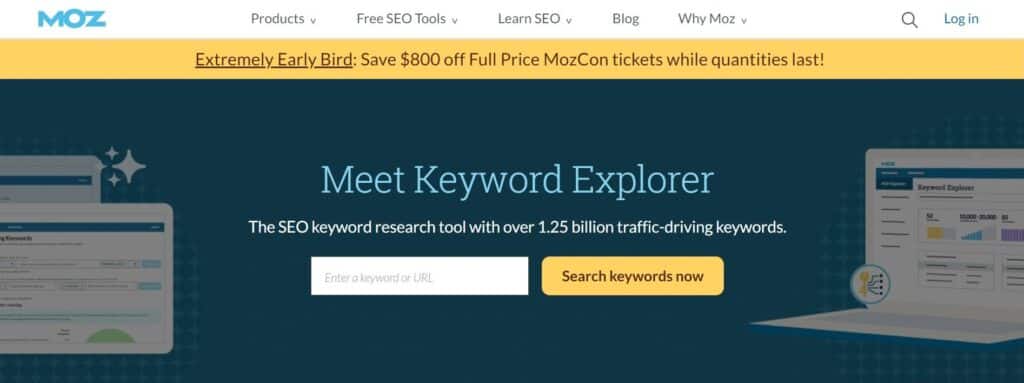
Moz Keyword Explorer is like a trusty guide for folks doing SEO. It’s all about finding the best words that can boost your website.
You type in a word, and it shows you lots of excellent info, like how many people search for it and how tough it might be to rank high using that word.
It’s like peeking into a secret treasure map! But, just like any tool, it’s got its quirks.
Some folks say it’s a bit pricey, especially if you’re a small business.
And sometimes, its numbers need to match up better with other tools.
Still, it’s easy to use, gives you loads of info, and helps you figure out which words can make your website shine brighter.
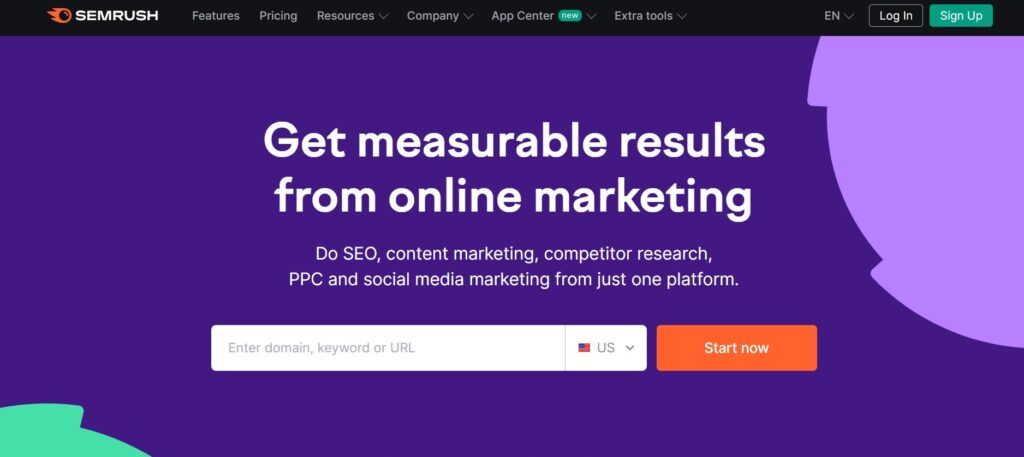
SEMrush is like a superhero for your website’s SEO! It’s packed with cool tricks to help your business stand out online.
One of its best features is digging up excellent keywords people search for. You can spy on your competitors, too!
It’s like peeking into their secret playbook to see what’s working for them and then using that to boost your website.
SEMrush also gives you a complete report card for your site, showing where you’re doing great and where you could do better.
But hey, it’s not all sunshine and rainbows. Some folks might find it a bit pricey, especially if you’re just starting. And it’s so jam-packed with features that it might feel like learning to drive a spaceship at first!
But once you get the hang of it, SEMrush becomes your trusty sidekick, helping you make intelligent decisions and grow your business online.
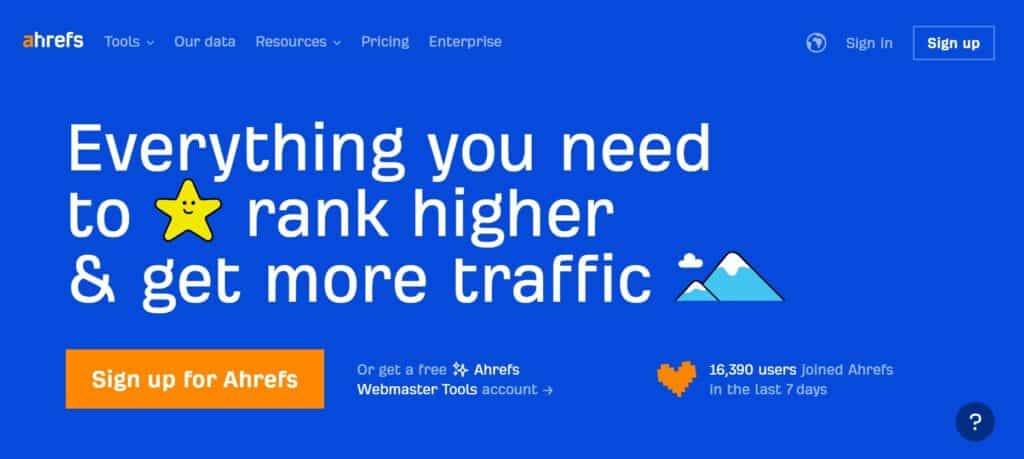
Ahrefs is like a super detective for the internet. It helps businesses find the best words to get noticed online.
Imagine it as a big book complete with words people search for. It shows which words are famous and which are more challenging to use.
Ahrefs also spies on other businesses to see what words they use, helping you make your website even better.
It’s like having a buddy who checks your website health and tells you what to fix.
But, it can be pricey for smaller teams and may feel tricky for new friends trying it out at first.
Overall, Ahrefs is a top helper for ensuring your website shines bright and gets noticed by many people.
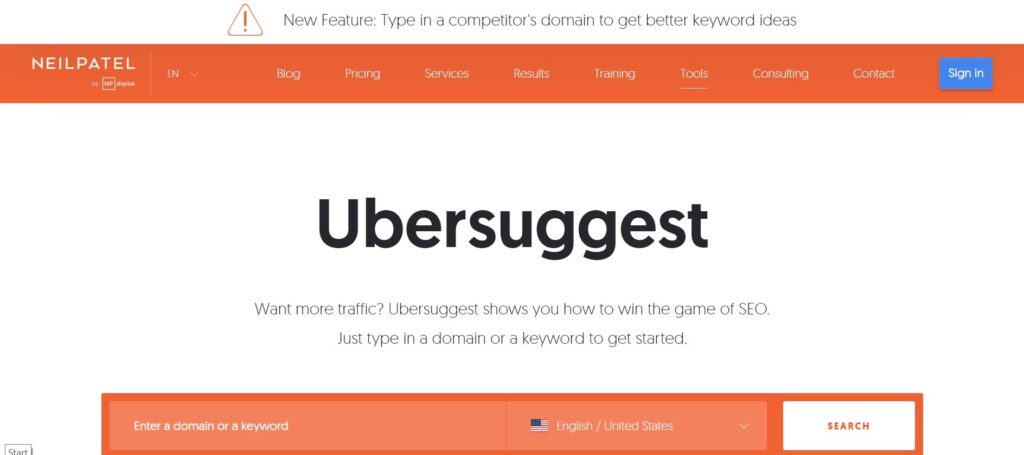
Ubersuggest is a helpful guide for your website’s success. Neil Patel designed it, and it’s great for finding the best words people type into search engines.
This tool gives you lots of ideas for words to use on your website that can help more people find you. It also looks at what your competition is doing to help you do even better.
Ubersuggest is easy to use, making it suitable for beginners in SEO. But sometimes, its guesses about how hard the word is to rank for might need to be higher, so it’s wise to check with other tools, too.
And while it’s super helpful, some other tools might have more info about links to your site.
Overall, Ubersuggest is an excellent tool for figuring out words to use and how to make your website better for search engines.
It’s like a friendly helper guiding you through SEO to boost your online presence.

Think of Keywords Everywhere as your friendly guide in finding the best words for your website. It’s like having an excellent sidekick that helps you know which words people search for the most, how much they cost, and how tough it is to rank for them.
This tool works like magic in your web browser as an extension, giving you these crucial details when searching on Google or checking your website stats. It even suggests similar words and longer phrases to make your website shine.
But, here’s the catch: Keywords Everywhere used to be free, and now it asks for a fee. Some folks find it a bit pricey, especially with recent changes limiting what you can do without paying more.
Still, if you’re serious about finding the best words for your website, Keywords Everywhere is worth considering.
It’s easy to use, gives you tons of info, and helps you better plan your website’s content.
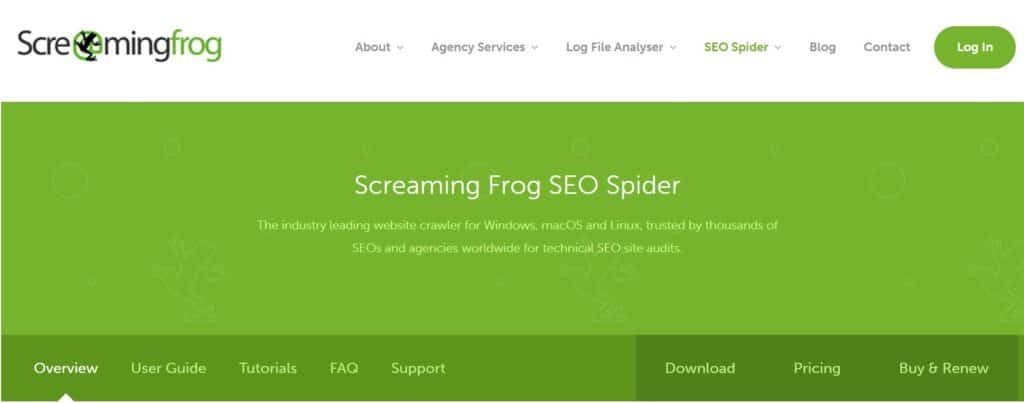
Features:
- Site Crawling and Analysis: Screaming Frog’s prowess lies in its ability to meticulously crawl websites, unraveling a comprehensive breakdown of on-page elements. It scrutinizes URLs, metadata, and headings and identifies issues like duplicate content, broken links, or missing tags.
- Data Visualization and Reporting: The tool generates visual representations of site architecture, facilitating a clearer understanding of internal linking structures and identifying opportunities for optimization. Detailed reports aid in communicating findings and actionable insights.
- Content Audit: With its ability to analyze page titles, meta descriptions, and headers, Screaming Frog assists in optimizing content for better search engine visibility. This feature is instrumental in fine-tuning on-page elements for improved SEO performance.
- Custom Extraction: Users can configure custom extraction to gather specific data from websites, enabling more profound analysis and extraction of crucial information beyond standard SEO elements.
Pros:
- Comprehensive Analysis: Screaming Frog’s thorough site crawl provides an exhaustive overview of on-page factors, empowering users to address issues that might hamper SEO performance.
- Intuitive Interface: Its user-friendly interface simplifies complex data, allowing users to navigate and interpret findings without extensive technical expertise.
- Regular Updates: The tool frequently updates its functionalities, incorporating new features and improvements to adapt to evolving SEO needs.
- Customization: Configuring custom extraction and reports offers flexibility in tailoring analyses to specific SEO objectives.
Cons:
- Resource Intensive: Screaming Frog’s crawling process can be resource-intensive for larger websites, potentially slowing down systems or requiring substantial memory and processing power.
- Limited Functionality in Free Version: While the free version offers valuable insights, its functionality is limited compared to the paid version, restricting access to advanced features.
- Learning Curve: Despite its user-friendly interface, mastering the tool’s full potential may require some learning, especially for those new to SEO analysis tools.
Screaming Frog is a robust on-page optimization tool, wielding a powerful suite of features that enable comprehensive website analysis and optimization. Its user-friendly interface and in-depth insights position it as a formidable ally in the quest for enhanced on-page SEO performance.

SE Ranking is a comprehensive on-page optimization SEO tool that offers a wealth of features designed to boost your website’s visibility and performance.
One of its standout features is its robust on-page SEO analysis, providing a detailed assessment of individual pages to identify areas for improvement.
It conducts thorough audits, scrutinizing elements such as meta tags, keyword density, internal and external links, and content quality, helping you fine-tune your pages for optimal search engine rankings.
Pros:
- Comprehensive Analysis: SE Ranking delves into various on-page factors, offering an extensive overview of your website’s optimization status.
- Keyword Research: It facilitates keyword research, enabling you to discover high-ranking keywords and monitor their performance.
- Competitor Analysis: Gain insights into competitors’ strategies and performance metrics to refine your SEO tactics.
- User-Friendly Interface: Its intuitive interface makes navigation and implementation of optimization strategies straightforward.
- White-Label Reporting: Generate professional reports branded with your logo to share progress and insights with clients or team members.
Cons:
- Learning Curve: For beginners, many features require time to grasp and utilize effectively and thoroughly.
- Pricing Structure: Depending on your business size and needs, the pricing tiers may be steep for smaller enterprises.
SE Ranking is a robust on-page optimization tool offering comprehensive features to enhance your website’s SEO performance.
Its detailed analysis, keyword research capabilities, and competitor insights empower businesses to effectively refine their strategies and improve search engine rankings.
Despite a potential learning curve and pricing considerations, its functionality and in-depth analysis make it a valuable asset for businesses seeking to elevate their online presence through optimized on-page SEO tactics.
Technical SEO Tools
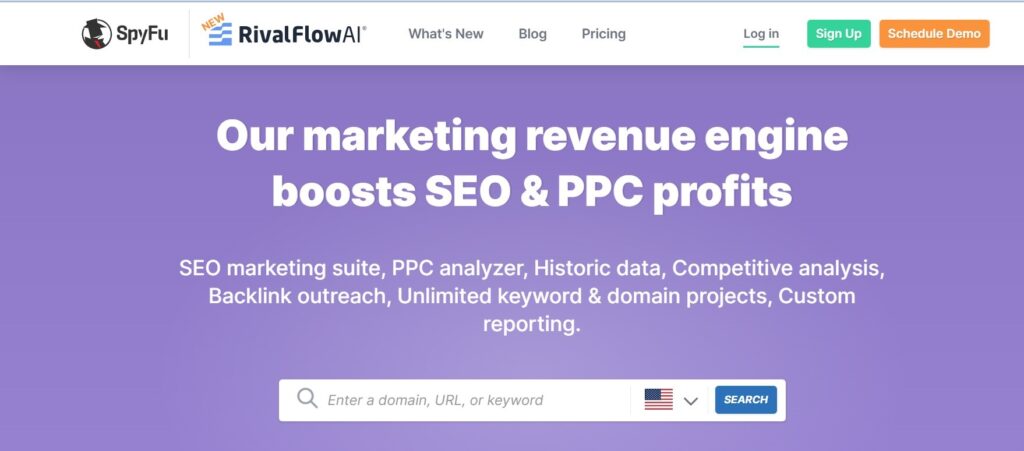
SpyFu is like your personal detective for boosting your website’s visibility in search engines. It’s fantastic for peeking into what your competition is up to and figuring out how to improve your site.
One cool thing it does is reveal the keywords your rivals are using to get noticed online. This info helps you build a more innovative strategy.
It’s not just about keywords, though. SpyFu also helps you check out where your competition is getting links from. Think of it as finding out where your friends hang out so you can join the same cool clubs.
Plus, it gives you a big-picture view of how well your site is doing in search results compared to others.
The good stuff? SpyFu is easy to use, even if you’re starting the SEO game. It gives you tons of data without overwhelming you.
How it tracks keywords and checks search results is convenient for making your site stand out.
But it’s not all rainbows and sunshine. Sometimes, SpyFu’s info needs to be spot-on or as fresh as you’d like. Also, SpyFu might be a bit pricey compared to other tools if you’re watching your budget.
Overall, SpyFu is like having a secret weapon for SEO. It’s great for spying on the competition and getting intelligent ideas to make your site shine online.
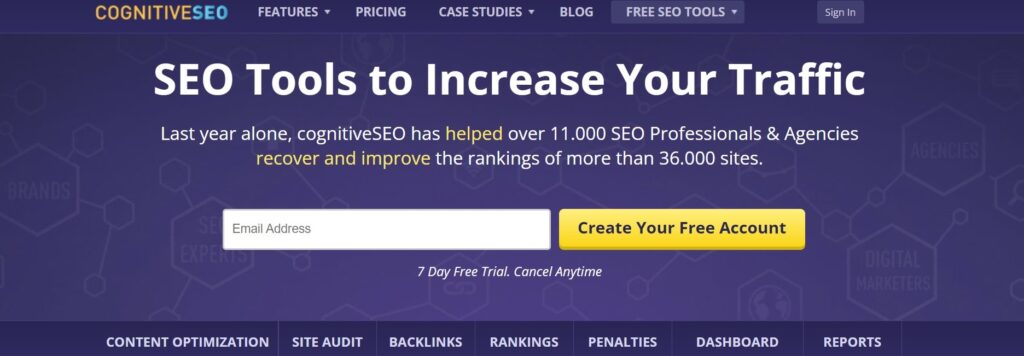
CognitiveSEO stands tall as a robust technical SEO tool that’s garnered a reputation for its comprehensive approach to optimizing online presence.
Its features encompass a spectrum of functionalities tailored for deep-dive analysis and strategic planning. Among its standout attributes, CognitiveSEO excels in its ability to conduct thorough website audits, spotlighting technical issues hindering site performance.
Its prowess lies in dissecting link profiles, identifying toxic backlinks, and offering solutions to bolster link-building strategies.
Its keyword research module also empowers users to uncover high-potential keywords, enhancing content visibility.
Pros:
- Advanced Site Audits: CognitiveSEO’s audits are exhaustive, identifying technical SEO glitches and ensuring a robust foundation for optimization efforts.
- Backlink Analysis: Its ability to dissect link profiles and weed out toxic backlinks is a boon for refining link-building strategies.
- Keyword Research: Its comprehensive keyword research tool aids in discovering high-value keywords vital for content visibility and ranking improvement.
- User-Friendly Interface: Despite its complexity, the platform maintains a user-friendly interface, simplifying the process for users of varying expertise.
Cons:
- Learning Curve: Given its extensive functionalities, the learning curve might be steep for beginners.
- Pricing Structure: While feature-rich, the pricing might be prohibitive for smaller businesses or startups.
CognitiveSEO emerges as a heavyweight contender in technical SEO tools, providing a wealth of functionalities crucial for businesses aiming to elevate their online presence.
Its prowess in uncovering technical issues, dissecting link profiles, and aiding keyword research makes it a compelling choice for businesses looking to streamline their SEO efforts.
However, its learning curve and pricing structure might be considerations for those new to the SEO landscape or operating on tighter budgets.
Backlink Analysis and Building Tools

Think of Majestic as your super-smart detective for your website’s connections. It’s like having a huge map of all the links from your site.
This tool is fantastic because it’s got this mega-collection of link data, so you can see who’s linking to your site and how strong those links are.
One cool thing is its Trust Flow and Citation Flow metrics. They’re like trustworthiness scores for websites. Trust Flow tells you how reliable a site is, while Citation Flow shows its influence.
The good stuff? Majestic is easy to use and gives you a history of your links so you can see how things change over time. It’s like looking back to see what happened with your links.
But, here’s the thing: if you’re new to this, Majestic might feel overwhelming. And while it’s great for link stuff, it might only cover some of the other SEO things you need. Also, it might be a bit pricey for smaller businesses.
In a nutshell, Majestic is fantastic for digging into your links, but you might need other tools to cover all your SEO bases.
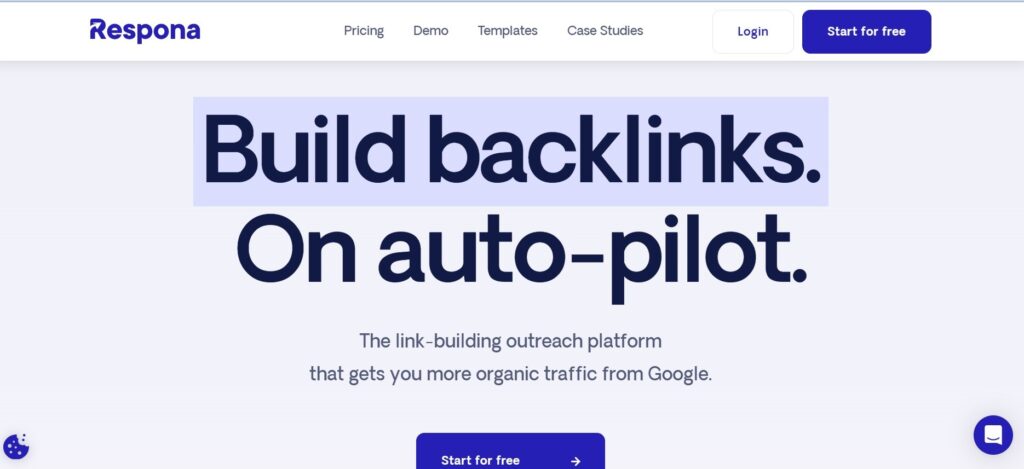
So, imagine Respona as your trusty guide in the big world of websites and links. It’s like having an excellent tool that helps your website become more famous and respected on the internet.
What Makes It Cool:
- Finding Secret Pathways: Respona helps you find these secret pathways called backlinks that strengthen your website. It looks at what other popular websites are doing and enables you to do it, too, so more people can find your site.
- Making Friends Easier: With Respona, sending emails to other websites becomes easy. You can write one email, which helps you send it to many different websites without repeatedly typing everything.
- Planning Your Adventures: You can plan how to make friends with other websites. It’s like making a map for your journey—picking which websites you want to be friends with and tracking who responds.
- Checking How Awesome You Are: Respona also tells you how well you’re doing. It’s like a report card but for your website. It helps you see if your actions are working or if you need to try something different.
What’s Great and What to Know:
- Saves Lots of Time: Because Respona helps with emails and keeping things organized, you can spend more time on fun stuff, like improving your website.
- Knows a Lot of Secrets: It’s like having a fantastic friend who knows a lot about websites. But since it’s so intelligent, it might take a little time to learn everything it can do.
- Might Cost a Bit: Having this excellent friend means paying more. Depending on your business, the price might be something to think about.
In a nutshell, Respona is like your online wingman, helping you find links and make friends with other websites. It has some nifty tricks to make your website more popular and trusted online.
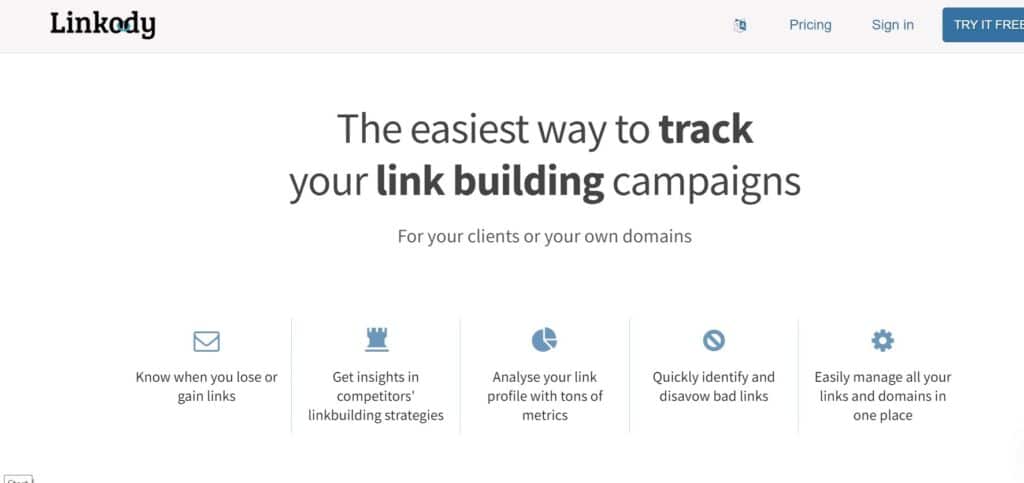
Linkody is like your trusty sidekick in the world of SEO! It’s super handy for checking your website’s links. It keeps you updated in real-time about new links and spots that are broken or lost.
This helps you find chances to build new links and fix any issues hurting your site’s links. It gives you excellent info, like how other solid websites are, what words they use for links, and even if they might be spammy.
Plus, it lets you peek at what your competition is up to so you can stay ahead. It’s easy to use, even if you’re new to all this SEO stuff.
It might only work with some platforms and have less info than other tools.
Still, if you want a simple tool that manages your website’s links and helps you build better ones, Linkody’s your back!
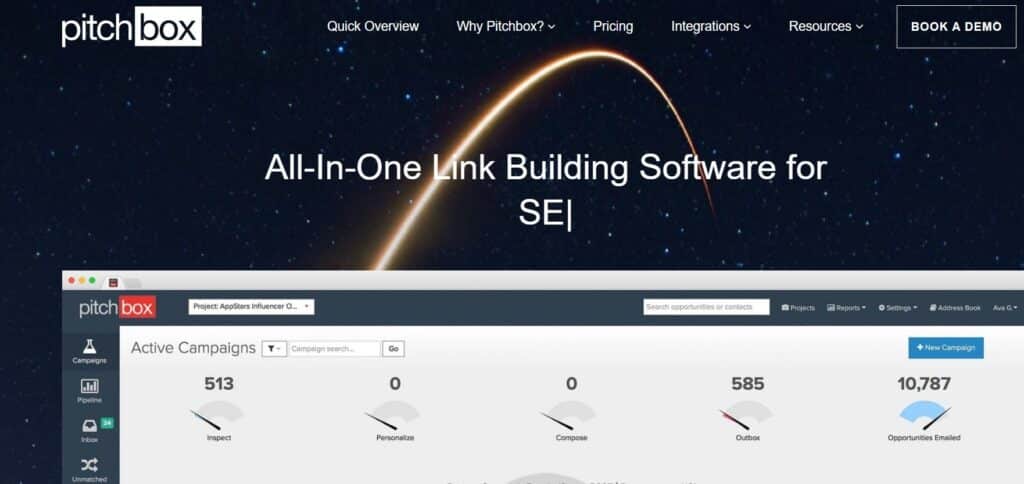
Pitchbox stands out as a robust backlink analysis and link-building tool, catering to businesses striving for improved SEO performance. Its feature-rich platform streamlines the backlink acquisition process by amalgamating prospecting, outreach, and relationship management in a single interface.
Users can meticulously analyze backlink profiles through its intuitive dashboard, identifying high-quality prospects for link-building campaigns.
One of its primary strengths lies in its extensive outreach capabilities, offering personalized email templates, automated follow-ups, and tracking functionalities.
This empowers users to craft tailored outreach campaigns, fostering genuine connections for acquiring valuable backlinks.
Additionally, Pitchbox’s comprehensive analytics provide insightful metrics to monitor campaign performance, enabling users to adapt strategies for optimal results.
Pros:
- Efficient Outreach: Automation and customization tools streamline the outreach process, enhancing efficiency.
- In-depth Analytics: Detailed insights and metrics aid in measuring campaign success and optimizing strategies.
- Workflow Management: A centralized prospecting, outreach, and relationship management platform simplifies workflow.
Cons:
- Learning Curve: Mastery of the tool might require time due to its diverse functionalities.
- Cost Consideration: Pricing might concern smaller businesses or those with limited budgets.
- Potential Overwhelm: The array of features could overwhelm novice users initially.
Overall, Pitchbox excels as a comprehensive tool for backlink analysis and link building, offering various features to streamline the process.
While it may pose a learning curve and cost considerations, its efficiency and detailed analytics make it a valuable asset for businesses aiming to enhance their SEO strategies and bolster their online presence.
Content Marketing SEO Tool

Regarding content marketing and SEO, BuzzSumo is a versatile and potent tool in a marketer’s arsenal. Its core functionality provides valuable insights into content performance across various platforms, aiding in informed decision-making and strategy development.
Features:
Content Discovery:
BuzzSumo excels in discovering high-performing content by allowing users to search for topics or keywords.
It offers a comprehensive overview of the most shared content across social media platforms, revealing trends, engagement metrics, and influencers amplifying them.
Competitor Analysis:
Understanding the competition is crucial. BuzzSumo enables a detailed analysis of competitors’ content strategies, uncovering their top-performing content, backlinks, and social engagement.
This information aids in benchmarking efforts and shaping your content strategy.
Influencer Identification:
Identifying influencers who resonate with your niche is simplified through BuzzSumo.
It helps discover key industry individuals who can amplify your content and extend its reach to a larger audience.
Content Alerts:
Stay updated with the latest trends and content performance with BuzzSumo’s content alerts. Receive notifications on specified keywords or topics, keeping you ahead in content creation and strategy.
Pros:
- Comprehensive Data: BuzzSumo provides detailed insights on content performance, social engagement, and influencer identification, offering a holistic view of the digital landscape.
- User-Friendly Interface: Its intuitive interface makes it accessible for beginners and seasoned marketers, allowing easy navigation and quick access to crucial information.
- Influencer Identification: The platform’s ability to identify influential figures in specific niches helps build valuable partnerships and expand content reach.
Cons:
- Pricing Structure: While offering various plans, the cost might be prohibitive for smaller businesses or individual users who are just starting and have limited budgets.
- Limited Historical Data: Depending on the subscription plan, access to historical data might be biased, restricting the depth of analysis for long-term trends.
In conclusion, BuzzSumo is an indispensable tool for content marketers seeking to enhance their SEO strategies.
Its robust features for content discovery, competitor analysis, influencer identification, and content alerts empower businesses to create data-driven, high-performing content while keeping a finger on the pulse of their industry.
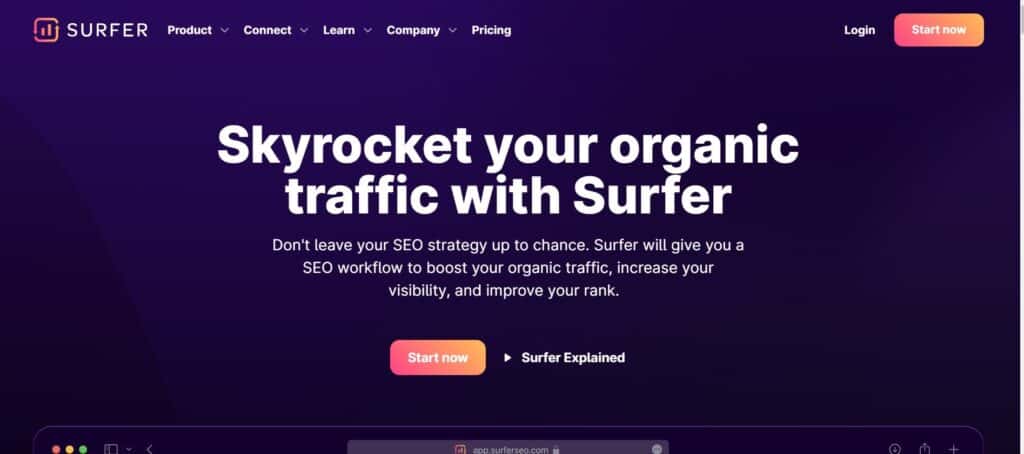
Surfer SEO is a robust and comprehensive tool for optimizing your content strategy. Its primary focus revolves around content optimization, utilizing a data-driven approach to elevate your rankings.
One of its standout features is the Content Editor, which provides detailed insights and suggestions for improving your content’s relevance and quality based on top-ranking pages for your target keywords.
This tool assesses factors like word count, keyword density, headings, and more, guiding you toward creating content that aligns with your audience’s search intent.
Surfer SEO doesn’t stop at content analysis; it offers a suite of tools for on-page SEO.
The SERP Analyzer empowers users to dissect search engine result pages, enabling a deeper understanding of ranking factors and suggesting adjustments to improve your page’s performance.
Additionally, its Keyword Research tool aids in discovering valuable keywords and their variations, providing insights into search volume, difficulty, and related terms.
Pros:
- Comprehensive Content Analysis: The Content Editor offers detailed guidance to fine-tune your content, making it highly relevant and valuable to users and search engines.
- User-Friendly Interface: Surfer SEO presents complex data in an easily understandable manner, allowing users to implement optimizations effortlessly.
- Data-Driven Recommendations: The tool relies on data and metrics to suggest improvements, ensuring a strategic content creation and optimization approach.
- On-Page SEO Insights: With features like SERP Analyzer and Keyword Research, it provides a holistic view of on-page factors, aiding in effective SEO strategies.
Cons:
- Learning Curve: While the interface is user-friendly, mastering all the functionalities might take time and effort.
- Pricing: Depending on your business size and needs, some users might consider the pricing relatively high.
- Limited Off-Page SEO Insights: Surfer SEO primarily focuses on on-page optimization, needing some features for comprehensive off-page SEO analysis.
Overall, Surfer SEO serves as a powerful ally for content marketers and SEO professionals, offering valuable insights and guidance to create highly optimized, search-friendly content that resonates with your audience and boosts your rankings.
14. Portent’s Content Idea Generator
Portent’s Content Idea Generator is a potent content marketing SEO tool designed to spark creativity and aid content strategists in generating engaging ideas for their SEO-driven campaigns.
At its core, this tool stands out for its simplicity and effectiveness in brainstorming unique content ideas that align with SEO objectives.
One of its primary features is its user-friendly interface, allowing even novices to quickly input a topic or keyword and receive various intriguing content suggestions.
Features:
- Keyword-Based Suggestions: By entering a keyword or topic, Portent’s tool generates catchy and clickable titles, offering a myriad of potential content angles to explore.
- Content Tone Customization: It enables users to choose the desired tone for their content, whether humorous, serious, or informational, enhancing its adaptability across various industries and audiences.
- Immediate Idea Generation: The tool provides instant suggestions, sparing users from lengthy brainstorming sessions and jumpstarting their content creation process.
- Versatile Application: It caters to blog posts and social media content, video ideas, and other forms of digital content creation.
Pros:
- Accessibility and Simplicity: Its intuitive interface makes it accessible to users of all expertise levels, streamlining the content ideation process.
- Inspiration Generation: It sparks fresh ideas, aiding content marketers to break through creative blocks and diversify their content strategies.
- Keyword Relevance: The tool suggests ideas aligned with SEO best practices, emphasizing keyword relevance and potential search engine visibility.
Cons:
- Limited Customization: While it offers a range of ideas, users might need help with fine-tuning or customizing suggestions to more specific niches or industries.
- Dependency on Keywords: Its reliance occasionally leads to somewhat predictable or generic suggestions, requiring additional creative input to stand out.
15. Siteliner
Siteliner is like a super detective for your website’s content. It’s fantastic at sniffing out stuff like copied content, broken links, and which pages are the real power players on your site.
What’s remarkable is that it doesn’t just say, “Hey, you’ve got duplicate content!” It tells you exactly where it is so you can fix it quickly. And it’s not just about copies – it also finds those pesky broken links.
Plus, it rates each page’s strength, so you know which ones are the heavy hitters.
The good stuff? Siteliner is easy to use. It’s like a buddy guiding you through your site’s content maze. And it checks both the links inside your site and those going outside, giving you the big picture.
But here’s the catch: The free version has a limit on how many pages it can check each month.
For more prominent websites, it might feel cramped.
Also, while it’s ace at spotting copies and links, it’s not the go-to for digging into keywords or checking out the competition. You might need other tools to cover your business’s SEO bases.
Picking the Right Tool
Okay, so choosing the best SEO tool for your business might seem like diving into a pool of options—lots of stuff floating around! But hey, let’s make this easy.
First off, think about what’s super important for your business. Are you all about keywords, checking out what your competitors are up to, or ensuring your site has excellent links? List these things— like making a recipe for the perfect tool.
Let’s give these things a score based on how much they matter. You know, like providing extra points to something crucial and fewer to the nice-to-haves.
Next, compare the SEO tools you’re eyeing using this list. Give them scores and see which ones match best with what you need. It’s like trying to find the best superhero for your team!
But hey, remember the real-life stuff! How easy is it to use? Can your team figure it out without getting a headache? Plus, does it play nicely with the other tools you already have?
Here’s a fun part: test them out! Get a trial or a demo and play around. See how they feel in action and ask your team what they think. It’s like test-driving a car before you decide to buy it.
Remember, it’s not just about the most features or the fanciest stuff.
It’s about finding the tool that clicks with your team and helps your business grow. Take your time, weigh your options, and choose the one that fits your business, like a perfectly worn pair of sneakers.
Implementing the Chosen Tool
Consider inviting a new teammate to the squad when bringing in a new SEO tool.
First, you must get them set up and synced with the rest of the crew. Follow the tool’s instructions step by step, and if you hit a bump, don’t hesitate to reach out for help—they’re like the coach guiding you.
Once they’re in, please get to know what they’re all about, like exploring a new app on your phone.
To make the most of it, stick to innovative ways of using the tool. Keep an eye on how things are going, check out any cool updates, and tweak the settings to suit your game plan.
Why not create a playbook so everyone’s on the same page? Doing all this will ensure your new SEO tool becomes a star player, boosting your business to new heights.
Measuring Success with the Chosen Tool
When you’re using an SEO tool, it’s like having a compass for your website. Do you want to know if it’s working? That’s where KPIs come in – like your scorecard, showing how healthy things are going.
Stuff like more people visiting your site, your keywords ranking higher, and whether those visitors are turning into customers.
By monitoring these things, you can see if the tool is helping your site get noticed by the right folks. And if it’s not hitting the mark, no worries!
You can tweak your plans, like changing your words or improving your content. It’s all about monitoring what’s working and making little adjustments to reach your goals.
Conclusion
When getting noticed online, picking the proper SEO tools is a big deal for your business. This guide has been about finding tools that fit your needs and ensuring they give you the most bang for your buck.
Remember, it’s not just about what these tools can do but how they help your business shine online.
So, when you start using the tool you’ve picked, think of it as a partner helping your business grow digitally.
Keep being proactive, roll with the changes, and watch your online presence soar, thanks to the excellent SEO tools you’ve chosen.
Frequently Asked Questions
What are the top local SEO tools?
Here are some of the top local SEO tools:
- Moz Local: Helps manage local business listings.
- Google My Business: Essential for local visibility on Google.
- BrightLocal: Provides tools for local SEO reporting and auditing.
- Yext: Manages business listings across multiple directories.
- SEMrush: Offers local SEO tools for keyword research and tracking.
These tools can assist in optimizing local search presence and improving local rankings for businesses.
What Are Some Common Features of SEO Tools?
Here are some standard features of SEO tools:
- Keyword Research: Helps identify relevant keywords for optimization.
- Site Audits: Analyzes website health and suggests improvements.
- Rank Tracking: Monitors keyword positions in search engine results.
- Backlink Analysis: Assesses incoming links to the website.
- Competitor Analysis: Evaluates competitor strategies and performance.
- On-Page Optimization: Offers suggestions for improving webpage content.
- Reporting and Analytics: Provide data and insights on SEO performance.
How Do SEO Tools Help Improve Search Engine Rankings?
SEO tools help improve search engine rankings by:
- Keyword Optimization: Identifying relevant keywords for better content targeting.
- Site Audits: Highlighting areas for site improvement to meet search engine standards.
- Backlink Analysis: Monitoring and acquiring quality backlinks to enhance authority.
- Content Suggestions: Providing insights to create optimized, valuable content.
- Performance Tracking: Monitoring rankings and adjusting strategies for improvement.
Can SEO Tools Identify Technical Issues on a Website That May Impact Its Search Engine Performance?
Yes, SEO tools can identify website technical issues that affect search engine performance. They conduct site audits to uncover problems like broken links, slow page speed, improper redirects, missing meta tags, or other issues impacting visibility and ranking on search engines.
How Do SEO Tools Help With Keyword Research and Content Optimization?
SEO tools assist in keyword research by providing insights into search volume, competition, and related terms, aiding in identifying high-performing keywords. They help content optimization by suggesting keyword placement, analyzing content quality, and tracking performance metrics to enhance visibility and ranking on search engines.
Can SEO Tools Provide Insights into the Performance of a Website and Its Competitors?
Yes, SEO tools offer insights into a website's performance by tracking metrics like traffic, rankings, and backlinks. They also provide:
- Data on competitors' performance.
- Revealing their keywords.
- Traffic sources.
- Strategies for comparison and analysis.
How Do SEO Tools Track and Measure the Effectiveness of SEO Efforts?
SEO tools track and measure SEO effectiveness by monitoring key metrics like keyword rankings, organic traffic, backlinks, on-page optimizations, and user engagement. They analyze changes over time to gauge the impact of SEO efforts and identify areas for improvement.
Are Any Free SEO Tools Available, and How Do They Compare to Paid Options?
Yes, free SEO tools like Google Analytics, Google Search Console, and Ubersuggest exist. While they offer valuable insights into basic metrics, paid tools often provide more advanced features, comprehensive data, and better analysis for in-depth SEO strategies and competitive analysis.
Are There Any Potential Drawbacks to Using SEO Tools?
Potential drawbacks of using SEO tools include:
- Reliance on automated data (which may lack context).
- Cost implications for premium tools.
- There is a need for interpretation skills to derive actionable insights from the data provided.
Additionally, tools may only sometimes account for nuanced search engine algorithm changes.












